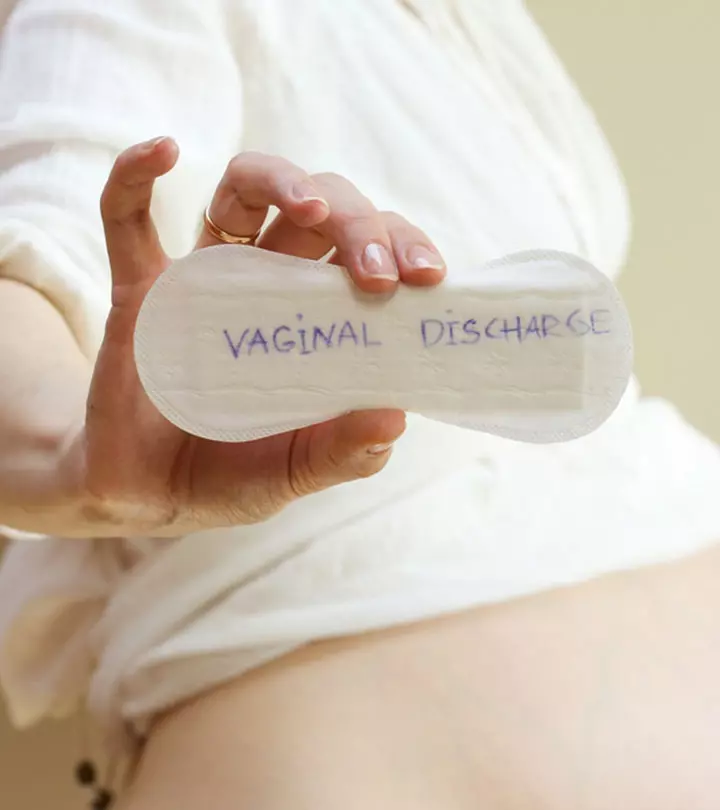
Image: Shutterstock
A healthy vaginal discharge is clear or milky white and odorless (or with a mild odor). The varying amount of vaginal discharge depends on whether you are menstruating, pregnant, or going through menopauseiTermination of a woman’s menstrual cycle in a woman due to a decrease in reproductive hormones or late menopause. (1) (2). Increased estrogeniA hormone responsible for the development and functioning of female reproductive organs levels may cause watery discharge during pregnancy, although this is not worrisome. However, if there are any color changes and a foul smell or other symptoms, it can be concerning (3).
Read on to learn more about watery discharge while pregnant, why it happens and how to manage it.
Key Pointers
- Normal discharge during pregnancy is typically milky or white in color, has a thin consistency, and a mild odor.
- Causes of white discharge during pregnancy include increased estrogen levels, changes in the vagina and cervix, rupture of the amniotic sac before labor, and amniotic fluid leakage.
- Discharge that changes color, has a foul smell, and is accompanied by a burning sensation and itching in the vagina can indicate an infection and may require medical attention.
- During the last trimester, heavy fluid flow requires immediate medical attention.
- Managing watery discharge during pregnancy can be done by using pads or panty liners, wearing comfortable clothing, and maintaining proper hygiene.
What Is Watery Discharge During Pregnancy?

Image: Shutterstock
During pregnancy, in the process of the body’s preparation to accommodate the baby, your cervix and the vaginal walls soften from enhanced estrogen levels. This leads to increased blood flow in the pelvic region, especially in the uterus and uterus cervix, where endocervical glandsiGlandular epithelial tissues situated in the inner cervix responsible for the production of mucus produce watery discharge. Pregnant women are more prone to infections. The increased watery discharge can protect the vagina from viruses and bacteria. It clears out the dead cells in the vagina (3).
This discharge might get heavier with the advance of your pregnancy, and you may even confuse it with urine. However, understand that it is normal.
An increase in discharge is also one of the early pregnancy symptoms, but it might not be the same in all cases. Therefore, you should look for other symptoms and take a pregnancy test (4).
 Quick fact
Quick factHow Does A Watery Discharge Appear?
During pregnancy, the watery discharge appears clear or milky white, with a thin consistency, and is called physiologic leucorrheaiAbnormally colored (white or yellow) vaginal discharge in women, often resulting from an infection . The discharge may either have a mild smell or no odor and resembles the vaginal discharge that you have before your periods. You might feel it in your underwear (5).
Is Having A Watery Discharge During Pregnancy Normal?
Watery discharge is common during pregnancy and holds a sticky consistency. As your pregnancy advances, the amount of discharge increases and may become thicker with a jelly-like consistency. A jelly-like discharge during pregnancy is often normal and usually results from increased cervical mucus. However, if the discharge becomes heavy, it could indicate your body’s preparation for labor. If you experience additional symptoms such as pain, a foul odor, or itching, seek prompt medical guidance (3) (5) (6).
What Are The Causes Of Watery Discharge In Pregnancy?
When you’re pregnant, you may experience watery discharge due to (4):
- Pregnancy-related changes in the vagina and cervix
- Increased estrogen levels
- Rupture of the amniotic saciThe membranous sac containing the amniotic fluid that protects and nourishes the developing fetus (water breaking) at the beginning of or during labor (6)
- Amniotic fluid leakage or premature rupture of membranesiRupturing of the amniotic sac before the onset of labor, usually due to infections (PROM) (7)
- Medications for incompetent cervix such as progesterone vaginal suppositories (8) (9)
A mother of three, Lynette Quah, shares her experience of having watery discharge from taking vaginal suppositories for an incompetent cervix during her third pregnancy. She says, “With the progesterone vaginal suppositories, there is a lot of watery discharge, and being an IC mom, the main worry is always the leaking of our waterbag.
“I have spoken to my doctor as well and he did say it’s normal but if it is troubling me (well, I was so troubled for weeks I did not get a good sleep as I was checking and checking whether the discharge would suddenly be a gush of water) then perhaps I should swallow it instead of inserting it (I was on Utrogestan, one of those you can take orally, so before you down any of your vaginal suppositories please speak to your OBGYN) (i).”
 Point to consider
Point to considerWhen Is Watery Discharge A Sign Of Concern?
If you have a vaginal discharge other than clear, milky or thin, it could cause concern. The associated symptoms and unusual changes may need a doctor’s attention (4).
- Foul or strong, fishy smell
- Vaginal itchiness or soreness
- Burning sensation
- Spotting or bleeding
- Change in the color of vaginal discharge to yellow, brown, pink, curdy white, or any other color
- Change in the consistency of the discharge
These symptoms and changes could indicate vaginal infections, including bacterial infection (vaginosis), parasitic infection (trichomoniasisiSexually transmitted parasitic infection characterized by genital itching and foul-smelling vaginal discharge in females ), yeast infection (candidiasisiA relatively common yeast infection causing itching, pain, and discharge in the vaginal region in women ), or sexually transmitted infection.
Since these infections can cause various pregnancy complications, ensure to consult your doctor as soon as you notice any of these symptoms (10).

Image: Shutterstock
You should also seek immediate medical care if you observe a heavy gush of watery fluid at the end of your pregnancy (i.e., water breaking) (6).
A clear watery discharge along with lower abdomen cramping necessitates medical intervention as it could signify pelvic inflammatory diseaseiInfection in the female genital tract characterized by pelvic pain, fever, and abnormal vaginal discharge (PID) or the onset of early labor (11).
Could not load the poll.How To Manage Watery Discharge When Pregnant?
Since watery discharge during pregnancy is not a cause of concern, it requires no treatment prevention. However, the following measures can help prevent heavy and abnormal watery discharge during pregnancy (12) (13):
- Wear cotton underpants, panty liners, or pads as per your convenience (5)
- Avoid wearing tight clothing, such as tight pants or bikini shorts, for a longer time
- Wipe your butt from front to back after the toilet use
- If you have irritation in your genital area, change your detergent
- Avoid hot tubs and feminine hygiene sprays, as these can cause irritation
- Maintain good hygiene by taking a bath everyday

Image: Shutterstock
- Avoid using tampons and douching as they may introduce unwanted germs
- Some birth control measures can also irritate some women; therefore, consult your health care provider if you notice any such symptoms.
 Quick tip
Quick tipFrequently Asked Questions
1. Is watery discharge in early pregnancy an indication of miscarriage?
No. The watery discharge during early pregnancy does not indicate a miscarriage. Instead, it shows that your vagina is healthy, and the increased estrogen levels are sufficient to stimulate increased watery discharge to protect the vagina from the entry of pathogens. Remember, vaginal discharge during pregnancy can vary in its quantity and consistency. Hence, as your pregnancy progresses, you may notice the discharge becoming thicker and milky.
2. Is excessive watery discharge a sign that my water broke or I am leaking amniotic fluid?
Excessive or heavy watery discharge along with contractions at the end of the third trimester could mean that your water broke and you’re going into labor or leaking amniotic fluid prematurely (PROM). The Ph level of the water is also vital. If the Ph is not acidic, a pregnant woman has to communicate with a doctor or go to the nearest hospital soon. You may have a steady trickle flow or gush of amniotic fluid when your water breaks, but it is PROM if you see the above signs before your due date (i.e., before the 37th week) (7).
3. What does a lot of clear watery discharge mean during pregnancy?
A lot of clear watery discharge in pregnancy could mean hormonal fluctuations in pregnant women and not a cause of worry.
4. Can watery discharge during pregnancy affect my baby?
No. Watery discharge is vital for protecting your developing baby. It maintains a healthy balance of beneficial bacteria in your birth canal and vaginal area, offering essential protection (15).
5. Is it safe to have sex if I have watery discharge during pregnancy?
Sex is generally safe throughout a low-risk pregnancy. If you’re unsure whether you’re considered low-risk or at risk of complications like pre-term labor or miscarriage, speak to your maternity care specialist, such as your obstetrician, gynecologist, or midwife (16).
6. Can medications cause watery discharge during pregnancy?
Some medicines may induce water discharge during pregnancy. Certain bone-strengthening medicines, such as bisphosphonates, can result in a white discharge as a potential side effect (17).
7. Can stress cause watery discharge during pregnancy?
Long-term psychosocial stress and cortisol exposure heighten the risk of developing vaginal infections, which may cause a discharge (18). Speak to your doctor for treatment and learn how to manage stress better.
Watery discharge during pregnancy is a typical occurrence caused due to physiologic changes and increased estrogen levels. Additionally, the vaginal discharge increases with the pregnancy advancement up to the last trimester. So, do not worry, but if you see any changes in your vaginal discharge, such as a change in odor, color, and other symptoms, contact your healthcare provider. Moreover, maintaining personal hygiene and avoiding feminine hygiene products can help prevent vaginal infections during pregnancy.
Infographic: Causes And Warning Signs Of Watery Discharge During Pregnancy
Having watery discharge during pregnancy is normal for many women and is usually not a cause for concern. However, it’s also important to know when to consult a doctor, as in some cases, it can indicate an infection or other complications. So, scroll through the infographic below to learn more about watery discharge in pregnancy. Illustration: Momjunction Design Team
Illustration: Is Having A Watery Discharge During Pregnancy Normal?

Image: Dall·E/MomJunction Design Team
Gain clarity on vaginal discharge, a natural occurrence among both pregnant and non-pregnant women. This informative video helps you differentiate between various types of discharge, enabling a grasp of normal and abnormal situations.
Personal Experience: Source
MomJunction articles include first-hand experiences to provide you with better insights through real-life narratives. Here are the sources of personal accounts referenced in this article.
i. Week 19 : Week By Week Incompetent Cervix Pregnancy Guide – Vaginal Discharge!https://klquah.blogspot.com/2014/11/week-19-week-by-week-incompetent-cervix.html
References
- Sailan-ur- Rahem (Leucorrhoea).
https://my.clevelandclinic.org/health/symptoms/4719-vaginal-discharge - Gene B. Bishop; (1990); Clinical Methods: The History Physical and Laboratory Examinations. 3rd edition.
https://www.ncbi.nlm.nih.gov/books/NBK281/ - Hormonal health – clues made clear.
https://www.jeanhailes.org.au/news/hormonal-health-clues-made-clear - Vaginal discharge during pregnancy.
https://www.pregnancybirthbaby.org.au/vaginal-discharge-during-pregnancy - Vaginal discharge during pregnancy: your questions answered.
https://www.nct.org.uk/information/pregnancy/body-pregnancy/vaginal-discharge-during-pregnancy-your-questions-answered - Labor and delivery.
https://my.clevelandclinic.org/health/articles/9676-labor-delivery - Preterm Premature Rupture of Membranes (PPROM).
https://www.urmc.rochester.edu/encyclopedia/content?ContentTypeID=90&ContentID=P02496 - Progesterone vaginal suppositories; Mount Nittany Health.
https://mountnittany.org/news-stories/health-and-wellness/ - Meena Khandelwal; (2012); Vaginal progesterone in risk reduction of preterm birth in women with short cervix in the midtrimester of pregnancy.
https://www.ncbi.nlm.nih.gov/pmc/articles/PMC3469232/ - National Guideline Alliance (UK); (2021); Management of symptomatic vaginal discharge in pregnancy: Antenatal care: Evidence review T. London: National Institute for Health and Care Excellence (NICE).
https://www.ncbi.nlm.nih.gov/books/NBK573944/ - Pelvic Inflammatory Disease (PID).
https://my.clevelandclinic.org/health/diseases/9129-pelvic-inflammatory-disease-pid - Vaginal Discharge.
https://familydoctor.org/condition/vaginal-discharge/ - Douching.
https://womenshealth.gov/a-z-topics/douching - Premature rupture of membranes.
https://medlineplus.gov/ency/patientinstructions/000512.htm - Vaginal discharge during pregnancy.
https://www.pregnancybirthbaby.org.au/vaginal-discharge-during-pregnancy - Sex During Pregnancy (for Parents).
https://kidshealth.org/en/parents/sex-pregnancy.html - Vaginal Discharge.
https://www.breastcancer.org/treatment-side-effects/vaginal-discharge - Psychosocial Stress, Cortisol Levels, and Maintenance of Vaginal Health.
https://www.frontiersin.org/journals/endocrinology/articles/10.3389/fendo.2018.00568/full
Community Experiences
Join the conversation and become a part of our nurturing community! Share your stories, experiences, and insights to connect with fellow parents.
Read full bio of Dr. Irene (Eirini) Orfanoudaki
Read full bio of Reshmi Das
Read full bio of Rebecca Malachi
Read full bio of Aneesha Amonz
















